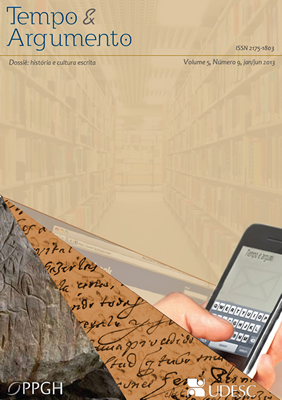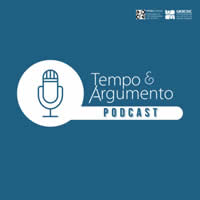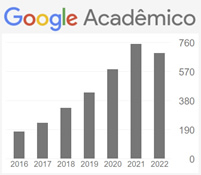Das escritas escolares às escritas de si: análise de cadernos diários de alunas da Educação de Jovens e Adultos - Florianópolis - 2008
DOI:
https://doi.org/10.5965/2175180305092013086Palabras clave:
Educação de Jovens e Adultos, EJA, história da cultura escrita, história da educação, cultura escolar, cotidianoResumen
O principal objetivo deste artigo é analisar dois cadernos de escrita diária de estudantes de um núcleo de Educação de Jovens e Adultos do município de Florianópolis no ano de 2008. Neste município, a EJA propõe uma metodologia de ensino baseada em projetos de pesquisa que partem do interesse e da realidade dos estudantes. Os cadernos aqui analisados são instrumentos de avaliação do curso, suportes de relatos elaborados diariamente por estudantes e respondidos por professores, que estabelecem, assim, diálogos através da escrita. Podemos, através deles, refletir sobre como esses instrumentos avaliativos deixam de ser suporte de uma escrita estritamente escolar e passam a ser suportes de uma escrita pessoal, constituinte de identidades e subjetividades, fontes privilegiadas para compreender dois dos principais campos historiográficos relacionados: a História da Cultura Escrita e a História da Educação. No âmbito da História da Cultura Escrita, grande importância se tem dado às escritas cotidianas ou “ordinárias”, que começaram a ser estudadas somente a partir da última década e são fontes privilegiadas para o conhecimento do cotidiano e dos fazeres de pessoas comuns. Numa posição complementar, pode-se pensar a História da Educação também a partir dessas fontes. Neste âmbito, os cadernos expressam a vida cotidiana em salas de aula, as práticas educativas que não constam em documentos oficiais ou livros e manuais didáticos, mas que demonstram como os processos educativos são apreendidos pela ótica do estudante, dando pistas para compreender determinada cultura escolar.Descargas
Citas
CASTILLO GÓMES, A. (Org.). Historia de La cultura escrita.Gijón (Astúrias). Ediciones Trea. 2001.CERTEAU, M. de. A invenção do cotidiano: 1. Artes de fazer. 14. ed. Petrópolis, RJ: Vozes, 2008.
CUNHA, M. T. S. No tom e no tema: escritas ordinárias na perspectiva da cultura escolar (segunda metade do século XX). In: BENCOSTTA, Marcus Levy Albino. (Org.). Culturas escolares, saberes e práticas educativas: itinerários históricos. São Paulo: Cortez, 2007.
GOMES, A. de C. Escrita de si, escrita da História: a título de prólogo. In: GOMES, Angela de Castro (Org.). Escrita de si, escrita da História. Rio de Janeiro: Editora FGV, 2004.
GVIRTZ, S.; LARRONDO, M. Os cadernos de classe como fonte primária de pesquisa: alcances e limites teóricos e metodológicos para sua abordagem. In: MIGNOT, Ana Chrystina Venancio (Org.). Cadernos à vista: escola, memória e cultura escrita. Rio de Janeiro: EdUERJ, 2008.
MIGNOT, A. C. V. CUNHA, M. T. S. Razões para guardar: a escrita ordinária em arquivos de professores/as. In: Revista Educação em Questão. EDUFRN. Natal | RN, v. 25, n. 11, jan./abr. 2006.
OLIVEIRA, I. B. de. Aprendendo com os cadernos escolares: sujeitos, subjetividades e práticas sociais cotidianas na escola. In: MIGNOT, Ana Chrystina Venancio (Org.). Cadernos à vista:escola, memória e cultura escrita. Rio de Janeiro: EdUERJ, 2008.
SILVA, C. B. (Org.). Histórias e trajetórias de jovens e adult@s em busca de escolarização.Florianópolis: Ed. UDESC, 2009.
VINÃO, A. Os cadernos escolares como fonte histórica: aspectos metodológicos e historiográficos. In.: MIGNOT, Ana Chrystina Venancio (Org.). Cadernos à vista: escola, memória e cultura escrita. Rio de Janeiro: EdUERJ, 2008.
Descargas
Publicado
Cómo citar
Número
Sección
Licencia
Derechos de autor 2013 Tempo e Argumento

Esta obra está bajo una licencia internacional Creative Commons Atribución-NoComercial 4.0.
Os artigos cujos autores são identificados representam a expressão do ponto de vista de seus autores e não a posição oficial da Tempo e Argumento.





